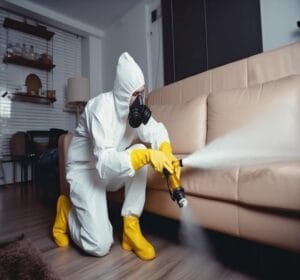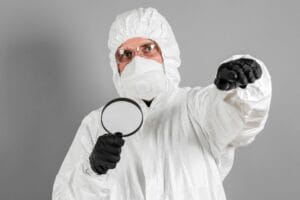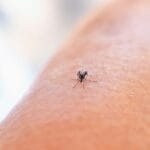Imagine settling into your cozy bed after a long day, only to wake up with itchy welts on your skin. Unbeknownst to you, bed bugs may have made your bed their new dining room. Catching these tiny intruders early can save you a lot of discomfort and trouble. Let’s get to the bottom of this and ensure your home stays safe and bug-free.
Key Takeaways
- Identify early signs of bed bugs to tackle infestations promptly.
- Check for physical evidence such as rust-colored stains, dark spots, and shed skins.
- Understand bed bug behavior to effectively disrupt their hiding and feeding habits.
- Learn simple yet effective home remedies to deter bed bugs.
- Know when it’s time to call in the professionals for bed bug extermination.
Spotting the Culprit: Recognize Bed Bug Infestation
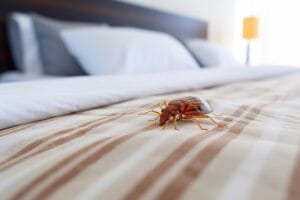
Bed bugs are masters of stealth, hiding during the day and emerging at night to feed. Knowing the early signs of an infestation can help you act fast and prevent them from spreading. These signs are subtle, but with a keen eye, you can spot them.
Physical Evidence of Bed Bugs
The first clue to a potential bed bug problem is often found on your bed itself. Look for these telltale signs:
- Rusty or reddish stains on your sheets or mattress, which could be the result of crushed bed bugs.
- Dark spots, about the size of a dot made by a marker, indicate bed bug excrement.
- Tiny eggs and eggshells, about 1mm in size, and pale yellow skins that nymphs shed as they grow.
- Live bed bugs, although they’re good at hiding, you might spot a live bug if you’re looking closely.
Bed bugs can be elusive, but they leave behind a clear trail. By examining your bed regularly, especially if you’ve recently traveled or brought second-hand furniture into your home, you can catch an infestation before it gets out of hand.
Unusual Marks: Bites and Skin Reactions
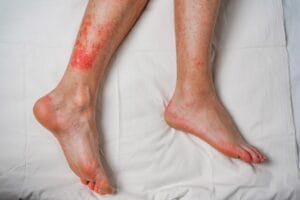
Another red flag is unexplained bites on your skin. These bites can appear as:
- Small, red, and itchy welts.
- Arranged in a line or cluster, often on the face, neck, arms, and hands.
- Accompanied by a localized burning sensation or swelling.
It’s crucial to remember that not everyone reacts to bed bug bites, and they can resemble those from other insects. So, while bites can be an indicator, they should not be the sole evidence of an infestation.
Natural Substances That Repel Bed Bugs
While keeping your home clean is the first line of defense, certain natural substances can help repel bed bugs. These aren’t a cure-all, but they can be part of your strategy to keep these pests at bay.
Essential oils, such as tea tree, lavender, and peppermint, are often touted for their pest-repelling properties. A few drops on your bedding or in a spray bottle with water can act as a deterrent. However, be mindful if you have pets, as some essential oils can be harmful to them.
Diatomaceous earth is another natural product that can be effective against bed bugs. This fine powder can be sprinkled around bed frames, baseboards, and other areas where bed bugs are likely to travel. It works by dehydrating the bugs as they crawl over it, leading to their demise.
- Tea tree oil
- Lavender oil
- Peppermint oil
- Diatomaceous earth
Simple Cleaning Tactics to Disrupt Infestations

Regular cleaning can go a long way in preventing and managing bed bug infestations. Vacuuming your home frequently, especially around beds and furniture, can pick up bed bugs and their eggs. Don’t forget to empty the vacuum outside immediately after to prevent them from escaping back into your home.
Safeguarding Your Mattress from Bed Bugs
One of the most effective ways to protect your mattress from bed bugs is to use a bed bug-proof encasement. These covers seal off the mattress and box spring, eliminating the cracks and crevices bed bugs love to hide in. They also make spotting bed bugs much easier since there’s no bedding for them to burrow into.
Call to Action: When to Contact Pest Control
If you’ve tried the above measures and still find signs of bed bugs, or if the infestation seems to be getting worse, it’s time to call in the experts. Pest control professionals have the tools and knowledge to tackle bed bug problems effectively and can provide peace of mind that the issue is being handled correctly.
Signs That Indicate You Need Professional Help
There are a few clear signs that it’s time to contact pest control:
Seeing bed bugs during the day, which suggests a large infestation.
Discovering a widespread distribution of bites among family members.
Noticing a persistent presence of the signs mentioned earlier, like stains and shed skins, despite thorough cleaning and use of home remedies.
Expectations from Pest Control Treatment
When you call in pest control, expect a thorough inspection of your home. They’ll likely use a combination of treatments, including chemical and non-chemical methods, to eradicate the bed bugs. It may take several visits to completely resolve the issue, and they’ll provide you with steps to follow between treatments.
Fortifying Your Fortress: Prevention Tips
Prevention is always better than cure. Regularly inspect your home for signs of bed bugs, especially after traveling or if you’ve brought in second-hand furniture. Use protective mattress encasements and keep clutter to a minimum to reduce hiding spots for bed bugs.
Regular Inspection Routines to Prevent Bed Bug Infestations
Make it a habit to inspect your sleeping areas regularly. Use a flashlight to check the seams of mattresses, bed frames, and any furniture near your bed. If you’re vigilant, you can catch an infestation early, making it much easier to control.
Traveling can also expose you to bed bugs, so inspect your luggage and clothing when you return home. A quick run through a hot dryer can kill any stowaways.
Protective Measures: Encasements and Deterring Tactics
Using encasements on mattresses and box springs can significantly reduce the likelihood of a bed bug infestation taking hold. These covers are designed to be impermeable to bed bugs and can be a simple yet effective way to protect your bed.
Beyond encasements, consider using interceptors on the legs of your bed. These devices trap bed bugs as they attempt to climb up, preventing them from reaching you while you sleep.
Sealing Cracks and Crevices: An Ounce of Prevention
Bed bugs can squeeze into the tiniest of spaces. Sealing cracks and crevices in walls, baseboards, and around electrical outlets can stop bed bugs from entering and escaping from these hiding spots. Use caulk or a suitable sealant to close off any potential entry points.
Frequently Asked Questions (FAQ)
Can bed bugs spread disease?

No, bed bugs are not known to spread disease. While their bites can be itchy and uncomfortable, the primary concern with bed bugs is the nuisance and discomfort they cause, rather than health risks. However, secondary infections can occur if bites are scratched and become infected.
How often should I check for bed bugs?
It’s wise to inspect for bed bugs regularly, especially if you travel frequently or purchase second-hand furniture. A monthly check of your sleeping areas and furniture is a good rule of thumb, but you may want to inspect more often if you’re in a high-risk situation, such as living in an apartment complex where bed bugs can spread more easily.
What do bed bug bites look like?
Bed bug bites often appear as small, red, and itchy welts. They can be random or in a straight line and usually occur on exposed areas of the skin like the arms, legs, and face. Not everyone reacts to bed bug bites, so absence of bites doesn’t necessarily mean absence of bed bugs.
Can I get rid of bed bugs without professional help?
It’s possible to tackle a mild bed bug infestation on your own with diligent cleaning, vacuuming, and the use of certain home remedies. However, for larger or persistent infestations, professional pest control services are recommended to ensure the bed bugs are completely eradicated.
Are there any effective natural remedies for bed bug infestations?
While no natural remedy is guaranteed to eliminate a bed bug infestation, some can help deter the pests. Diatomaceous earth, essential oils like tea tree or lavender, and maintaining a clean environment can all be part of a broader strategy to manage bed bugs. Always combine these with good cleaning practices for the best chance of success.
